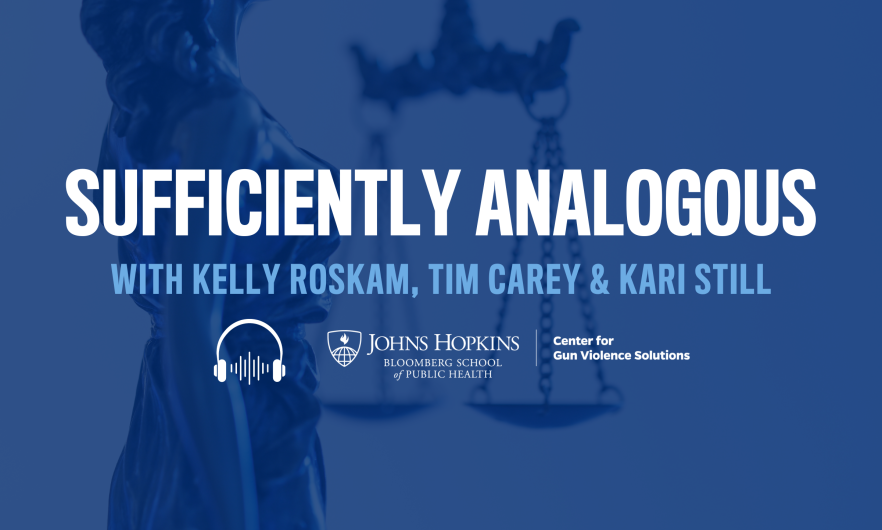Introducing "Sufficiently Analogous": A New Podcast Analyzing Second Amendment Court Cases
The Center’s new podcast explores firearm policies in a post-Bruen United States.

In recent years, the Second Amendment has been the subject of intense debate and interpretation. Legal battles, court cases, and policy changes are reshaping the landscape of gun rights and regulations in the United States that affect our every-day lives. To dissect these complex issues, the Johns Hopkins Center for Gun Violence Solutions is proud to announce its new podcast, "Sufficiently Analogous," co-hosted by the Center's law and policy director, Kelly Roskam, JD, alongside law and policy advisors Tim Carey, JD and Kari Still, JD.
Listen to Our First Episode
In "Sufficiently Analogous," Roskam, Carey, and Still will examine Second Amendment court challenges to gun safety laws and will explore the potential implications of these challenges on public health policies aimed at reducing gun violence. With a focus on providing insightful analysis, the podcast aims to shed light on the intricate legal issues surrounding gun rights and regulations.
“We’re thrilled to share important conversations about complex issues that every American should know about,” says Roskam. “In New York State Rifle & Pistol Association v. Bruen, the Supreme Court abandoned the reasonable test relied on by courts for over a decade, creating a volatile legal environment with major consequences and even more questions. On ‘Sufficiently Analogous’ we’ll use our expertise to translate some of the most important court cases of this century and try to make sense of a post-Bruen America.”
The podcast’s roster of co-hosts brings a unique perspective and years of experience to the podcast. Roskam has been working in the gun violence prevention space for more than a decade. She has worked particularly closely with survivors of domestic gun violence. Roskam is a nationally renowned expert in interpreting the constitutional implications of Second Amendment law.
Carey started his career as an attorney representing children in abuse and neglect cases. After seeing the impacts of missed opportunities to prevent harm, he now focuses his work on gun violence prevention.
Still was inspired to focus on firearm law after experiencing the impacts of gun violence first-hand. After working as a domestic violence prosecutor, she has now been litigating Second Amendment cases for more than two years.
In the inaugural episode of "Sufficiently Analogous," the team and their guests take a deep dive into the case of Maryland Shall Issue v. Moore—a case that could shape the future of Firearm Purchaser Licensing laws across the country. Last year, a three-judge panel of the U.S. Court of Appeals for the Fourth Circuit found Maryland’s Handgun Qualification License (HQL) unconstitutional. An HQL is a form of Firearm Purchaser Licensing that requires would-be handgun purchasers to apply for and receive a license. The two-judge majority ruling stated that the HQL, while not a permanent ban, violated the Second Amendment because it prevented individuals from immediately obtaining a handgun.
“Maryland Shall Issue v. Moore is the perfect case to begin our podcast,” says Still. “It includes nuances we’ve been seeing play out in the courts in recent years: shifting precedent, unclear guidance from the Supreme Court, and even judges who don’t fully grasp the policies they’re tasked with ruling on. Policies like Maryland’s HQL law are pivotal to maintaining public safety and challenges like this will have a broad impact on public health.”
The State of Maryland successfully petitioned for the case to be heard by a panel of all active judges of the Fourth Circuit – a process known as a re-hearing en banc. On March 21st, 16 judges of the Fourth Circuit in Richmond, Virginia heard oral arguments in Maryland Shall Issue v. Moore. The inaugural “Sufficiently Analogous” episode will analyze the judge’s arguments, dive into the impacts of Firearm Purchaser Licensing laws, and discuss the history that potentially justifies the law.
“As questions abound about the future of firearm policy in America, we’re looking forward to taking a journey with our audience to navigate this new legal landscape together,” says Carey. “There certainly is no shortage of cases with major implications to discuss, analyze and debate. We’re looking forward to discussions that both legal experts and every-day Americans can appreciate and understand.”
Stay tuned as "Sufficiently Analogous" unpacks this case and many more, providing listeners with valuable insights into the ever-evolving landscape of Second Amendment jurisprudence.




